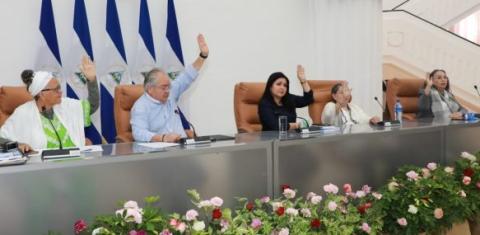
Photo from the Nicaraguan National Assembly of the vote to amend the constitution to revoke citizenship on February 9, 2023
February 15, 2023
Nicaraguan President Daniel Ortega released 222 political prisoners, exiling them to the United States on February 9.
Many of the people freed were imprisoned in 2021 during the buildup to Ortega’s latest re-election, as we reported at the time. Following arrests under false pretexts and a sham election, the U.S. imposed sanctions. Some speculate that freeing the political prisoners was part of overtures seeking the relief of U.S. sanctions. Secretary of State Antony Blinken said in a press statement that the release is “a constructive step towards addressing human rights abuses in the country and opens the door to further dialogue” between both nations. President Ortega said of the exchange, “let them have their mercenaries.”
Freedom came with a price. Hours after former prisoners headed to Dulles International Airport in Virginia, the Ortega-controlled legislature reaffirmed that all were “traitors” and amended the constitution to revoke their citizenships. Two of the prisoners refused such terms of freedom, including Catholic Bishop Ronaldo Alvarez of Matagalpa. The following day, his citizenship was also revoked and he was sentenced to 26 years in prison. According to Reuters, Bishop Alvarez was convicted of treason, undermining national integrity and spreading false news, among other charges.
Consequently, all these prisoners emerge stateless – a move illegal under international law.
While the release of political prisoners is welcome, the revocation of citizenship and expulsion is part of a trend of increasing authoritarianism under the Ortega regime. In 2018 we published a report by former Maryknoll Lay Missioner Catherine “Kitty” Madden on the protests and a violent crackdown that followed. In the build-up to the 2021 election, Ortega imprisoned five of his would-be opponents as well as many other critical voices—politicians, journalists, public figures, and Catholic clergy. The five presidential opponents are among those released this week. Presas y Presos Políticos Nicaragua notes that there are at least 38 more political prisoners still in detention. Through 2022, the Ortega government has also cancelled and expelled hundreds of religious and civil society organizations from the country, especially those based in the United States. The expulsions were ostensibly because “they hindered the control and surveillance of the General Directorate of Registration and Control of Non-Profit Organizations” for failing to break down financial statements with details of donor addresses and phone numbers.
The recent trend emanates from deep scars. Daniel Ortega was first elected president by a supermajority in what many viewed as a free and fair election in 1984. The Reagan Administration contested the election, however, and began illegally funneling arms and money to the government’s violent opposition, the Contras, in the Iran-Contra Affair. After Ortega’s first presidency, his party fell out of power until he regained the presidency by a 2006 election by a plurality vote. Since 2014, his party has amended the constitution to remove term limits, and he and his wife, Vice President Rosario Murillo, are midway through a five-year term.
While we welcome the freedom granted to the 222, we lament that they are not able to remain free in their own country. The Biden administration has been welcoming of the released prisoners, and members of the high-profile group have been individually offered Spanish citizenship. The affair raises questions over displacement and the legal status of the exiled Nicaraguans. It is unclear what the prospects will be for the many more who remain in wrongful detention in Nicaragua, Bishop Ronaldo Alvarez among them. We are likely to learn more about human rights violations experienced by the released prisoners while in detention. We also have yet to see if and/or how U.S. sanctions against Nicaragua will change in the future as a result of this development.
The dissatisfaction with the incomplete justice offered to the 222 was expressed elegantly in a press statement by Organization of American States:
“What happened today is not a ‘liberation.’ These people were unjustly imprisoned—some for years—for thinking, expressing, or writing opinions contrary to the prevailing regime in Nicaragua. Many of them were tortured and cut off from all contact with the outside world…. They arrive in the United States supposedly ‘deported’ from their own country. The crimes committed against these people must not go unpunished, and their rights must be restored as soon as possible.”
